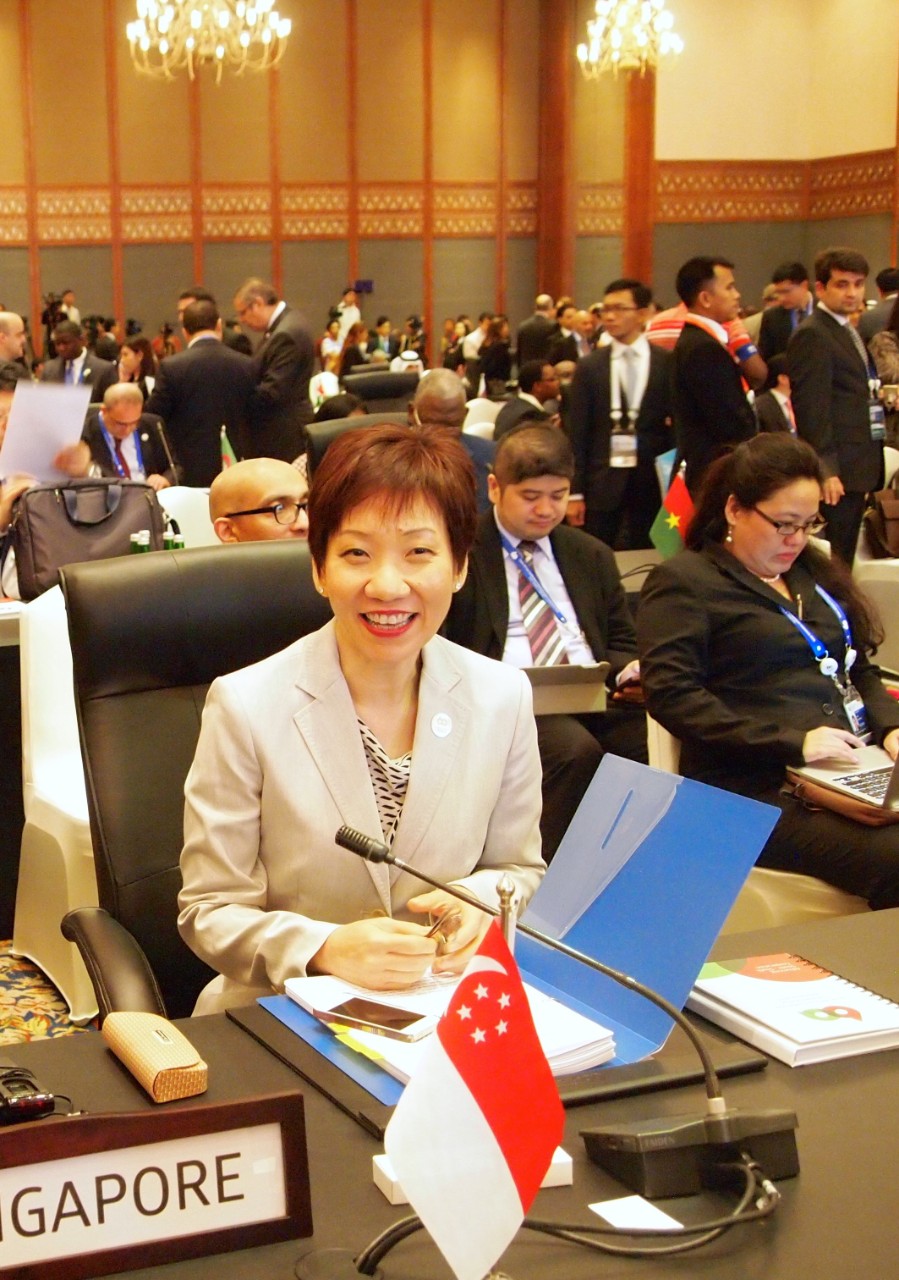
Minister Grace Fu, Minister, Prime Minister’s Office, Second Minister for the Environment & Water Resources and Second Minister for Foreign Affairs, visited Jakarta, Indonesia, on 20 April 2015 as Head of the Singapore delegation to the Asian-African Ministerial Meeting. The theme of the Meeting was “Strengthening South-South Cooperation to Promote World Peace and Prosperity”.
At the Meeting, delegations from Asian and African countries exchanged views on strengthening international cooperation and inter-regional dialogue between the two regions. Minister Fu delivered a national statement that highlighted the potential for increased inter-regional economic cooperation, and the need to strengthen Asian-African cooperation on global challenges such as climate change, combating piracy, and countering extremist terrorism.
At the side-lines of the Meeting, Minister Fu met the Minister for Foreign Affairs of the Republic of Madagascar, Béatrice Atallah, where the warm relations between the two countries were reaffirmed. They also discussed further cooperation in trade and maritime issues between Madagascar and Singapore.
. . . . .
MINISTRY OF FOREIGN AFFAIRS
SINGAPORE
20 APRIL 2015
STATEMENT BY
SECOND MINISTER (FOREIGN AFFAIRS) GRACE FU
AT THE ASIAN-AFRICAN MINISTERIAL MEETING
IN JAKARTA ON 20 APRIL 2015
Distinguished Colleagues
Ladies and Gentlemen
1. I would like to congratulate Indonesia for the successful hosting of this gathering of Asian and African friends. This Conference sets the stage for stronger and more vibrant ties between our two continents in the spirit of Bandung. Indonesia’s leadership has enabled the New Asian-African Strategic Partnership (NAASP) to become a useful platform for engagement between Asia and Africa. The NAASP involves countries representing more than half of the UN membership and more than two thirds of the world’s population. It is a unique and significant forum where major global issues of concern can be discussed between two of the world’s largest regions.
2. This Meeting brings together the world’s two fastest growth nodes – Asia and Africa. Individually, both regions are doing well for themselves, growing at more than five percent last year. There is much potential for increased inter-regional economic cooperation. Earlier this year, the African Union adopted a new ‘Agenda 2063’ encompassing a vision for Inclusive Growth and Sustainable Development. Indeed, we are seeing political and economic transformation in Africa which has created new opportunities for cooperation. Singapore, like other states, has responded to this. The Singapore Business Federation has organised 14 trade missions to Africa in the past 4 years. To support our businesses’ increased engagement with Africa, International Enterprise Singapore, which is the agency responsible for economic cooperation, opened two commercial centres in Accra (Ghana) and Johannesburg (South Africa). This reflects our businesses’ optimism in Africa’s long-term outlook. But headwinds can still blow us off course. There are complex challenges that will continually come our way.
3. In a globalised world, no country or continent can isolate itself from events elsewhere. One such example is the rise of extremist terrorism. Earlier this month, we saw the brutal mass murders at the Garissa University College in Kenya by armed militants. Barely a month before that, the international community was similarly horrified by the terrorist attack at the Bardo Museum in Tunis that also led to the loss of many innocent lives. These attacks were preceded by many more high profile attacks by extremist groups over the past few years.
4. Developments in the Middle East have had significant global impact. We now see the extensive use of social media by violent groups to spread their extreme ideologies globally, including by encouraging self-radicalisation among disaffected individuals in countries around the world. The effects of these phenomena will continue to pose immense challenges to countries far away from the Middle East, including those in Asia and Africa. Singapore therefore welcomes the inclusion of counter-terrorism as a theme under the agenda of the NAASP. There is much scope for Asian and African nations to co-operate and share their experiences on this issue.
5. Another transboundary challenge in both Asia and Africa is piracy. With the major international sea lanes straddling the two continents, piracy not only threatens the safety of sea-farers, but increases the cost of shipping as well. This affects vital trade flows both for individual nations and for the global economy as a whole. The international community has stepped up its efforts to counter piracy. An example is the Combined Task Force 151 initiative mandated by the United Nations Security Council (UNSC) to respond to increased piracy in the Gulf of Aden. This is a vital international waterway for the global supply of crude oil from the Persian Gulf. Regional efforts have also been made to improve maritime security of global sea lanes, such as the Code of Conduct to combat piracy and illicit maritime activity in the Gulf of Guinea, and the Regional Cooperation Agreement on Combating Piracy and Armed Robbery Against Ships in Asia (ReCAAP).
6. International cooperation is critical if we want to truly tackle climate change. A concerted global effort by all countries, both developed and developing, is needed to reduce carbon emissions and mitigate the effects of climate change. At the same time, with episodes of extreme weather occurring at increased frequency, all countries need to build up their capacity to cope with it. In Southeast Asia, we have tried to do so through the ASEAN Action Plan on Joint Response to Climate Change, which includes research collaboration on climate change science, information sharing on adaptation efforts, and enhancing meteorological centres and networks.
7. Asia and Africa are well-poised for closer cooperation and dialogue in the next decade. This Conference offers a chance for the countries in our two continents to demonstrate political will and unity in responding to common challenges and opportunities to work together.
. . . . .